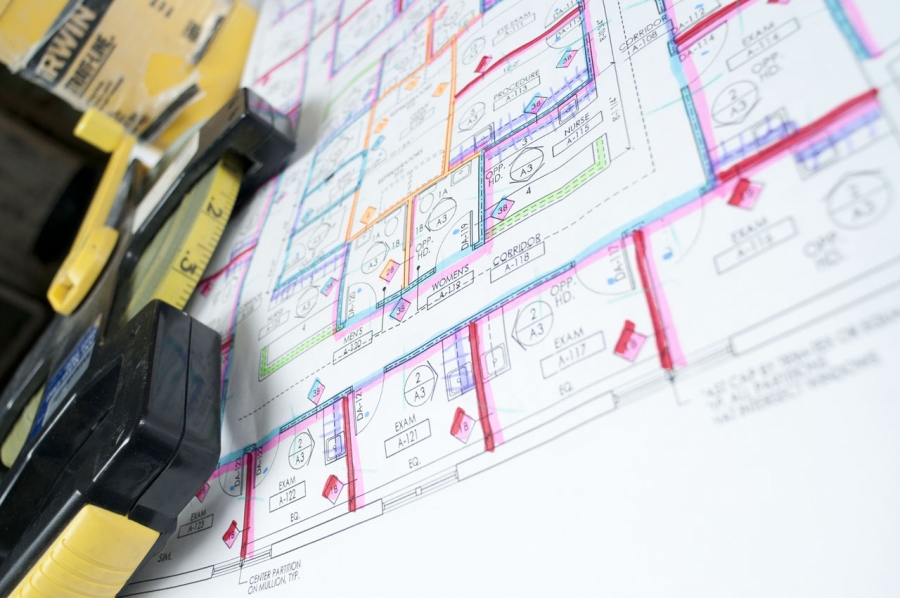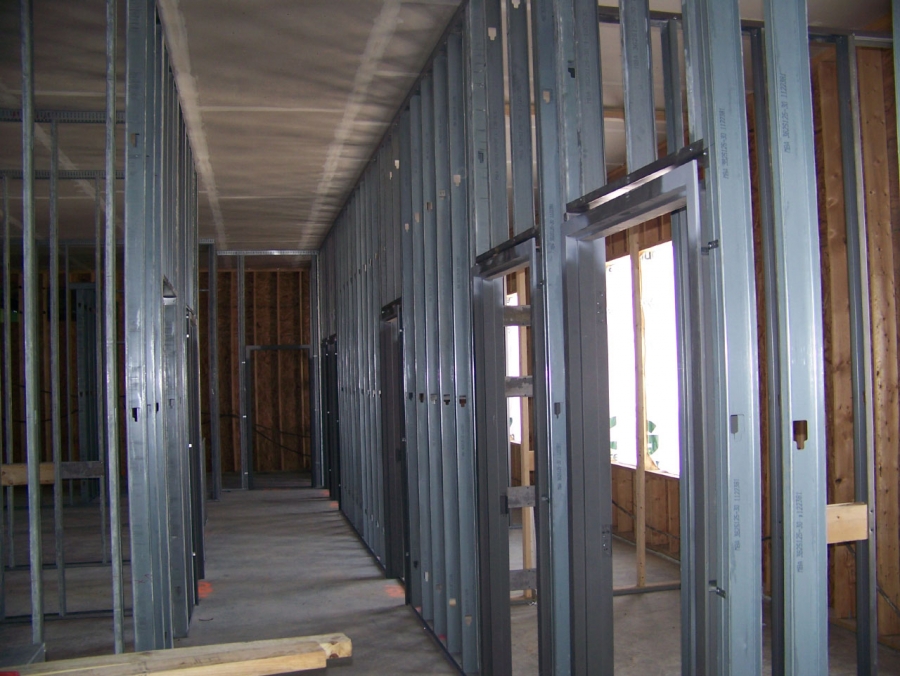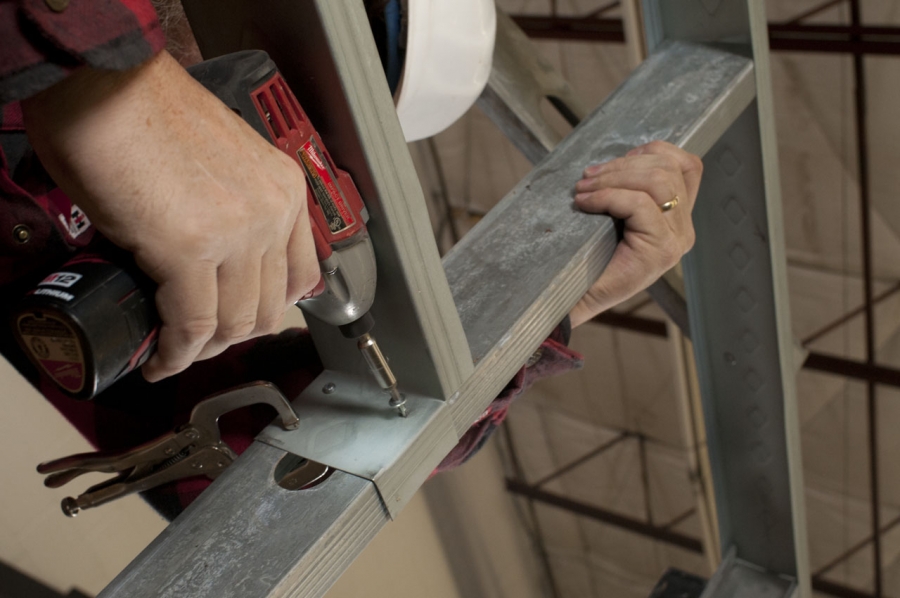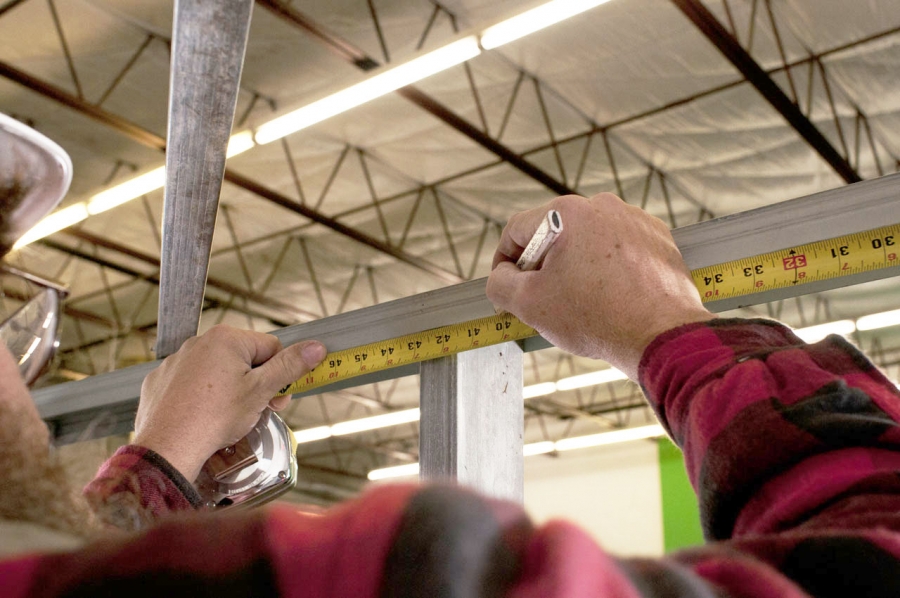金属螺柱轨道布局和击落
承包商对承包商:跟随专业室内承包商罗伯特·希姆斯,因为他产生了一个布局和最终的射击金属螺柱轨道系统。
垂直,水平,方,直:所有的木工都是一样的,对吗?嗯,没有。应用基本的建筑原则,但如何构建金属钉与建筑大不相同木。下面的讨论提供了安装金属螺柱的系统解释,并为每个步骤提供了各种最佳实践。
 图片由Damian Wohrer提供
图片由Damian Wohrer提供
一开始……

您是与蓝图,一堆螺柱和支架的工作。下一步是什么?希望你有机会到看打印几天来熟悉平面图,墙体剖面图,立面图和细节。它更容易获得建筑师的脑海里,当你看到他们的意图。更妙的是访问该网站,然后再开始的机会。在这一点上经常访问的网站是不可能的,但是,你在现场几乎到达“盲”。在任何情况下,你需要攻击计划。之前展开的版画,走现场,回答几个问题。是空间的增加?你必须匹配现有的材料? Is it a new work out of the ground? Do you have multiple floors with framing that has to line up? How high is your deck? What does it consist of? Is the floor old concrete or new? Did the steel erection/masonry/concrete people do a good job (are things level, plumb, and square)? Are you under roof and dried in? Is there temporary power? Have you worked with this general contractor or these other sub contractors before? The answers to these questions affect how you proceed.
布局
问问你的总负责人是否有任何问题。到这个时候,他应该知道了。大多数人愿意承认这一点,而且现在纠正差异比等到它们出现在地毯上或橱柜上要容易得多,也更好。智能框架可以涵盖很多问题,首先是布局。展开你的印刷品,并尝试将图纸定位到实际的建筑布局。这有助于避免“北/南、东/西”的混淆。我喜欢用一个滚动的迷你脚手架作为桌子。携带你的框架正方形,额外的粉笔,和50'和100'的卷尺上你的迷你脚手架。如果刮风的话,你可以用它们来按住你的画。寻找两个最长的外壁,它们之间的维度是90度。 The longer the wall, the less likely it is out of square. These will be your reference lines. Check them for square. If you don’t have a convenient set of walls to use for reference, create your own lines. Find the center of each end of your project, chalk a center line, then chalk a 90 degree line off that. Use the largest 3:4:5 multiple you can. (A right triangle where the sides are in the ratio of 3:4:5 will give you a 90 degree angle every time.) Start with a line, mark the point you want to square, and make a second mark 4' down the line. Measure off your first mark approximately square to your line, sweeping a small arc at 3' with your pencil. Place your tape on the 4' mark and measure back 5' toward your arc. Sweep an arc at this measurement. The point where the two arcs intersect is square to your original mark. Any multiple of 3:4:5 (such as 6:8:10, 12:16:20, 30:40:50, etc.) will produce the same results. Use the largest multiple that is practical. Take care to "nail" the intersection point when striking the line.




按照你的方式在平面上工作,把建筑师的尺寸加起来。一般情况会告诉你尺寸是粗糙的还是光滑的。如果没有,那么看看打印上的开口和房间大小。如果它们是偶数,那么很可能打印与完成尺寸。小心你的数学。糟糕的添加总是会导致问题。现在测量工作的总体规模。这些应该和印花相配。如果没有,那就找±号。这将给你空间来决定墙壁的位置和房间的大小。 If the discrepancies are large, bring the Job Super in on it. He can pass the problem up the chain of command to get a decision. Next, it would not hurt to find out from which direction the plumbers and electricians pulled. It is easier for you to move your walls than for the plumber to move his pipes. This is the choice most Supers make, so save yourself time and money by clarifying these potential conflicts. Move a chalk line, not a wall.




一旦你对你的起始点感到满意,开始你的布局。随身携带一把好扫把,在涂粉笔前要把每一面墙都扫一遍,以避免灰尘影响你的线条。如果你有助手,请和他保持一致;沟通错误是一个比糟糕的数学更普遍的问题。总是,总是减少变量。(我在构思过程中一直这么说。)不管你是用胶带的末端“零”还是剪一英寸,都要一致。如果你的粉笔线错过你的布局标记1/4 ",扫线并再次罢工。在布局上的错误会贯穿整个过程,然后不断增加,我称之为“工作蠕变”。完美的开始——你不会变得更好。 Don’t assume someone farther down the line will correct things. More likely, they will add their mistakes to yours and those mistakes will accumulate into sloppy, unacceptable work. Often, when chalking long walls, a third person will jump in and hold down the middle of the line with his finger, snapping each half. I discourage this because no matter how tight you pull your line (and it needs to be tight) unevenness in the floor often skews straightness. Pinning it down in the middle does not allow the line to self-correct when lifted before the snap. Just pull the line high and straight up, snap, and then have your helper do the same on the other end. Avoid lifting the line at an angle: that is the surest way to get a "double" line because the string will bounce on contact with the floor. I have found that marking and striking both sides of each wall is the best way to avoid "shoot-down" mistakes. If there is danger losing your lines, spray them with clear lacquer. I spray them lightly at the "crow’s feet" and will rechalk when shooting down track as necessary. How far you place door openings from inside corners is often spelled out on the prints; if not, try to leave your finisher enough room to get at least a 4” knife between the door frame and the adjacent wall. How wide you make door openings depends on the type of frame being used and how the door clips are attached. The rule of thumb for welded jambs is 2-1/8” X 2 plus the door width. So a 3’-0” door with welded jamb would require a 3’-4-1/4” opening. After-drywall knockdown frames typically need 1” past each side of the door, so a 3’-0” door with knockdown frame would require a 3’-2” opening.
跟踪
在布局完成后,首先开始考虑需要挂哪些墙。当然,外墙、走廊和全高度的墙需要在其他分区之前建好,但试着把它们想成一个干墙衣架,并为它们提供一个平滑的挂钩“路径”。我倾向于从左到右挂石膏板,所以我的角绕着房间逆时针旋转。这是右手衣架的自然进程。对于3-5/8 "墙,切断4-1/4 "到4-3/8 "的内部法兰的一端轨道,将接受浮动或拍击螺栓。(不要切断和折叠法兰出来!这会突出过干墙,给铺地板的人造成不必要的麻烦。)把另一块轨道的末端放在这一块的顶部,这样外部法兰接触。你应该在内部有一个足够宽的缝隙,以便石膏板在不绑定的情况下滑进去,但又不能太宽以至于浮动螺柱掉出来。根据这个经验法则,优先考虑你击落的东西:首先是角,然后是墙的末端,然后是门的边缘,然后是轨道末端,然后是其他所有东西。 For corners, line up both pieces of track on their marks and put firm pressure on the corner, taking care to not move the track, then shoot it down. I generally shoot my first pin about 2” off center in case it blows out. If it does, lift the track, brush out any debris, reset the track, and try again 2” away. One pin should hold both pieces down. Go to the other end of your track, shoot it down, and then fasten the rest of it. Some track will have a crown in it, so you might have to apply side pressure with your foot to align it to the chalk line. Some prints prescribe what fasteners you use and their spacing. As a general rule, 16” on center zigzagging as you go is enough for powder or gas loads. Small pieces of track can be hard to shoot down and keep aligned, so avoid using them near corners or doors unless you have to.





关于切割螺栓和轨道的一个词
你可以用剪刀轻松晋级20和25号石膏板金属。有些人喜欢剪断法兰,分数与美工刀网,以及“翼”轨道来回,直到它分开。这给你一个漂亮的直边,但费时。我的首选方法是削减两个法兰,弯曲网页,然后从点切略电弧“笑脸”来点。这是有效的,但它可以产生上有很多切割作业手部疲劳的一个很好的协议。在较大的工作,如果使用切割锯,了解烧的镀锌掉金属的危险。有足够的通风。浓缩的蒸气可以和会杀了你。此外,经营切割锯时,使用一切预防措施:有守卫的地方,确保股票,磨损保护眼睛,站的叶片旋转的出路。



自信伴随着能力。练习会让你变得更好。不要羞于检查你的工作。如果事情偏离正轨,回溯并找到问题所在。良好的布局和拍摄,使工作。挺括、笔直的线条是一个伟大的名片!好运!
详细图库的轨道布局过程:

罗伯特Thimmes
拥有30年室内贸易经验和15年Homefront建筑公司老板的罗布•希姆斯(Rob Thimmes)大多数时候仍然穿着他的工具。作为一家小公司的所有者/经营者,他曾身兼数职:估价师、会计、卡车司机、仓库工人、项目经理、主管、领班、熟练工人和工人。当他不工作的时候,他喜欢写作、打铁、做礼拜、他的家庭以及“解决世界上所有的问题”。



































